Bridging the gap between Indigenous and scientific communities to promote equitable ecological practices.
Founder & Executive Director Robert Thigpen
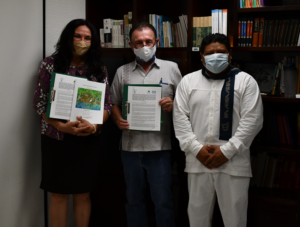 Robby has been living with Indigenous peoples since 1996. He came to the Caribbean in 2004 to use stable isotope analysis to elucidate food webs of the Indigenous lobster fishery of Belize. Lately, he has been developing methods to seamlessly combine Indigenous ecological knowledge systems with Western science to create biocultural curriculum, a novel STEM curriculum for the linguistically diverse education systems of the greater Caribbean basin and beyond. For him it was paramount that his Indigenous sisters and brothers recognized their ecological wisdom in these curricula and to see it treated as equal to Western science.
Robby has been living with Indigenous peoples since 1996. He came to the Caribbean in 2004 to use stable isotope analysis to elucidate food webs of the Indigenous lobster fishery of Belize. Lately, he has been developing methods to seamlessly combine Indigenous ecological knowledge systems with Western science to create biocultural curriculum, a novel STEM curriculum for the linguistically diverse education systems of the greater Caribbean basin and beyond. For him it was paramount that his Indigenous sisters and brothers recognized their ecological wisdom in these curricula and to see it treated as equal to Western science.
Biocultural curricula are biology curriculum that recognizes the importance Indigenous ecological knowledge systems and are indistinguishable from modern biology curricula to biologists and educators. These biocultural curricula have multiple secondary benefits such as language documentation, teaching mother tongue reading comprehension and writing skills and can be used for language revitalization to name just three.
Deputy Director: Thomas Dean King PhD.
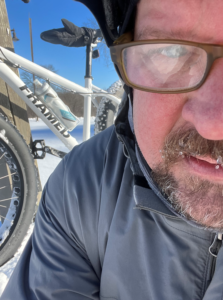 Tom studied cultural anthropology with a focus on collective action institutions, economic development, and resource management in fisheries settings. He earned his Ph.D. based on work conducted in Belize among the fisherman of the Northern Fisherman’s Cooperative Society. Toward the end of his graduate education in 2000, Tom moved back to his home state of Minnesota, where he took up a career in information technology to pay for his education. He has supported businesses across insurance, retail, finance, and healthcare. He currently manages a data governance program for Optum, a division of UnitedHealth Group.
Tom studied cultural anthropology with a focus on collective action institutions, economic development, and resource management in fisheries settings. He earned his Ph.D. based on work conducted in Belize among the fisherman of the Northern Fisherman’s Cooperative Society. Toward the end of his graduate education in 2000, Tom moved back to his home state of Minnesota, where he took up a career in information technology to pay for his education. He has supported businesses across insurance, retail, finance, and healthcare. He currently manages a data governance program for Optum, a division of UnitedHealth Group.
Tom’s tie to MCB goes back to early discussions with Robby to form the ideas behind the Treasures “book project”. Tom and Robby maintained a dialogue focused on the specific challenges and opportunities to promote a sustainable future for the fishing peoples of Belize. Through the work supporting the mission and vision of Marine Conservation without Borders, Tom is applying his background in social science research, program management, and information technology and data management to help preserve the lifeways and ecosystems in places like Belize’s Northern Lagoon.
Tom currently lives in Minnesota where is spends his free time raising three children and nurturing their interests in youth sports, school, and other recreations. When the stars align, he may even get outside for a walk in the woods or a fishing trip with friends and family.
Secretary: Ashley Epling
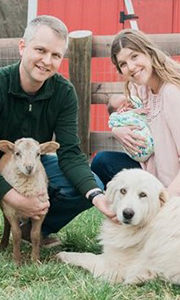 Ashley is a small organic farmer in the foothills of Virginia. She holds a BS in Ecology & Environmental Biology from Appalachian State University. She is passionate about building resilient food systems that sustain our land, water, and resources as well as people and traditional livelihoods. Ashley's family farm business focuses on sustainable practices, heritage varieties & breeds, and traditional foodways
Ashley is a small organic farmer in the foothills of Virginia. She holds a BS in Ecology & Environmental Biology from Appalachian State University. She is passionate about building resilient food systems that sustain our land, water, and resources as well as people and traditional livelihoods. Ashley's family farm business focuses on sustainable practices, heritage varieties & breeds, and traditional foodways
Treasurer: Jaedon Kinser
Jaedon is currently working as a Service Advisor at a car dealership in the state of West Virginia, United States. He graduated with Magna Cum Laude honors from Marshall University with his Bachelor of Business Administration in the spring of 2022. 2 years earlier in the spring of 2020, he graduated from Mountwest Community and Technical College with 3 associate degrees in Management Technology with High Honors, Banking and Finance with High Honors, and Accounting with High Honors. Jaedon has always had a passion for helping others in the past he has worked as tax return preparer for the Volunteer Income Tax Assistance program that helps provide free tax returns to underserved communities throughout the United States. Beyond his education and volunteer work, Jaedon enjoys spending time in nature and taking road trips with his friends.
Hilario Poot Cahun
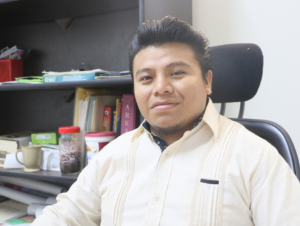
Hilario is a Maya born in Tihosuco, Quintana Roo, México. Maya is his first language. He graduated from the Universidad Intercultural Maya de Quintana Roo with a degree in Maya Language and Culture. In the summer of 2010 he participated in the Indigenous Youth Leadership Seminar at the University of Arizona and in July 2014 the Indigenous Language Documentation and Revitalization workshop at the University of Texas, Arlington. In the fall of 2014 he carried out a research stay at the Center for Mayan Studies of the Universidad Nacional Autónoma de México (UNAM). He is a teacher of Mayan language and translation. Hilario is working directly with Robby to refine MCB’s ethnotranslation methods that make biocultural curriculum possible. He has directed thesis projects on the didactics of translation and on the teaching-learning process of Maya [yua]. He is currently a teacher of an Indigenous primary for the Department of Indigenous Education of Quintana Roo and teacher by subject at the Universidad Intercultural Maya de Quintana Roo in José María Morelos, QRoo México.
Robert Wayne van Devender PhD.
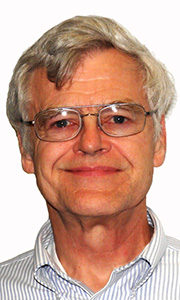
Wayne was born in Roswell NM in July of 1947 and was chasing lizards around the desert before he was three years old. He caught his first snake, a diamondback watersnake, when he was 7 or 8 and has been chasing small animals ever since. After diversions into hunting and fishing he was captured by the challenges and prospects of herpetology (study of amphibians and reptiles) by field trips to West Texas during high school in the Dallas TX area. Four years at Yale produced broader interests in science, herpetology, and photography in lieu of any artistic ability. Later, at the University of Michigan, he realized his longstanding desire to go to see and study tropical creatures during his dissertation work on Jesus Christ lizards (Basiliscus basiliscus). At Michigan he also met and eventually married Amy Shrader, who continues to share his life to the present. After receiving his Ph.D. in 1975 he worked in the Museum of Zoology at Michigan, taught at Oklahoma State University, and carried out field surveys of endangered species in Michigan until he was hired at Appalachian State University in 1978 to teach Mammalogy and Herpetology.
The Boone years have produced many milestones in Van Devender’s life: three children; new love for salamanders, land snails, and leeches; travels to five new continents; publication of thousands of photographs and several papers on salamanders and leeches; life-long relationships with students and colleagues; and productive relationships with local, regional, and international herpetological societies and the Association of Southeastern Biologists. Recent years have seen increased focus on distribution and biogeography of land snails and the development of skills in both the scanning electron microscopy and molecular biology laboratories. His students have studied mammals, reptiles, amphibians and problems ranging from stream siltation to movements of hellbenders to the effects of environmental pollution on local populations. He still visits schools with his snake show and enjoys teaching to groups from second grade through graduate students.
Myrna Kaye Manzanares (30/11/1946 - 21/12/2021)
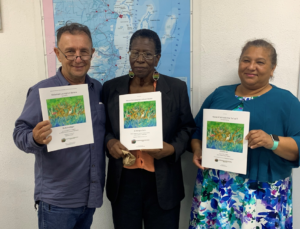 Ms. Myrna was an ardent human rights, sexual and reproductive health rights, women, youth, community, and education activist. She is also an International traditional storyteller, a published writer, poet, dramatist, educator and a trained counselor. She is the immediate past president of the National Kriol Council (NKC) and perceives herself as a culturist, concerned about her Kriol Culture as well as inter-ethnic harmony of the Belizean peoples and by extension the world. She is the present Cultural Attaché to the National Kriol Council. She serves on the Editorial Board of the Journal for Belizean studies and is one of the editors of the Kriol language materials, including the Kriol/Inglish Dikshinari and the yearly Kriol Kalinda, published by the Kriol Langwij Projek, the linguistic arm of the NKC. In 2016 she coordinated the completion of the New Testament in Kriol through the Wycliffe Institute. She is on the executive board for the Belize History Association. Ms. Manzanares received the British Empire‘s medal from the Queen of England in June of 2008, for her work in Culture, Education and Social Development, and a Meritorious award for her service to Belize in 2010. She also received the Woman of Culture award from the National Institute of Culture and History during Women’s History month in 2016.
Ms. Myrna was an ardent human rights, sexual and reproductive health rights, women, youth, community, and education activist. She is also an International traditional storyteller, a published writer, poet, dramatist, educator and a trained counselor. She is the immediate past president of the National Kriol Council (NKC) and perceives herself as a culturist, concerned about her Kriol Culture as well as inter-ethnic harmony of the Belizean peoples and by extension the world. She is the present Cultural Attaché to the National Kriol Council. She serves on the Editorial Board of the Journal for Belizean studies and is one of the editors of the Kriol language materials, including the Kriol/Inglish Dikshinari and the yearly Kriol Kalinda, published by the Kriol Langwij Projek, the linguistic arm of the NKC. In 2016 she coordinated the completion of the New Testament in Kriol through the Wycliffe Institute. She is on the executive board for the Belize History Association. Ms. Manzanares received the British Empire‘s medal from the Queen of England in June of 2008, for her work in Culture, Education and Social Development, and a Meritorious award for her service to Belize in 2010. She also received the Woman of Culture award from the National Institute of Culture and History during Women’s History month in 2016.
Ms. Myrna left us this week, but she will always be an important part of this project. She was the first person outside of the fishery that I shared my idea with and she understood exactly what I was trying to do. She was always steadfast in her encouragement to continue with the project. With her and the Belize National Kriol Councils help we developed our prototype biocultural curriculum written eena Kriol ahn Inglish. Since that time, we have been able to develop a science book in all five Indigenous languages for Belize and Belize may be the first country that can make that claim. None of our work would have been possible without her encouraging me. I am lucky to have known her. ~Robby Thigpen
Grace Fortune Msc.
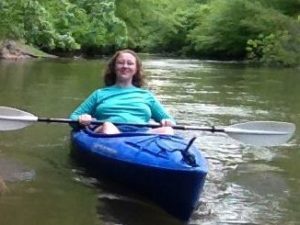 Grace Fortune worked with middle school children on the coast of North Carolina in Wilmington and in the mountains of NC in Boone, NC. She taught a class through the public school system entitled Project Venture. Project Venture is an experiential learning opportunity to encourage students to take care of themselves, their families, friends, community and the environment.
Grace Fortune worked with middle school children on the coast of North Carolina in Wilmington and in the mountains of NC in Boone, NC. She taught a class through the public school system entitled Project Venture. Project Venture is an experiential learning opportunity to encourage students to take care of themselves, their families, friends, community and the environment.
Grace taught team-building and communication games to students with the goal of increasing respect and self-reliance. Grace led students on outdoor adventure trips including: biking, bike maintenance, kayaking, river ecology, leave no trace, caving, hiking, camping, bow drill fires, knots, and ropes courses. Students learned a love and respect for their natural surroundings in hopes of creating environmental stewards for the future of Appalachia and across the globe. Students participated in community service projects to gain the sense of pride in giving back to others.
Grace’s current efforts include educating students and parents about college access opportunities for low income and first generation students. She continues to draw from the learning experiences in outdoor pursuits and community service. She is committed to providing experiential learning opportunities and giving youth the power to take care of themselves and their communities.
Drew Gentry
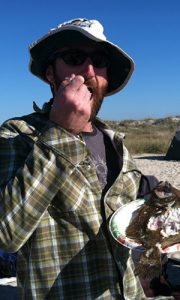 Drew works in the Parks Department for the City of Raleigh, North Carolina. His focus is on restoring natural areas and stream corridors, chiefly by removing non-native invasive vegetation and replanting with native species. The goal is to provide better habitat for wildlife and to create better experiences with nature for the surrounding communities.
Drew works in the Parks Department for the City of Raleigh, North Carolina. His focus is on restoring natural areas and stream corridors, chiefly by removing non-native invasive vegetation and replanting with native species. The goal is to provide better habitat for wildlife and to create better experiences with nature for the surrounding communities.
Drew attended Appalachian State University and met Robby Thigpen through the Biology Department. He was introduced to marine ecosystems through a course in coral reef biology, which included a research trip to Belize. When Robby was down there doing lobster research and living on Caye Caulker, Drew was one of the few North Carolinians to pay a visit, and spent many memorable days out there and on the mainland. Drew has seen Marine Conservation without Borders grow since its inception years ago, and joined the Board of Directors because he believes that conservation education is the key to preserving our natural heritage in perpetuity.
Phil Dustan PhD.
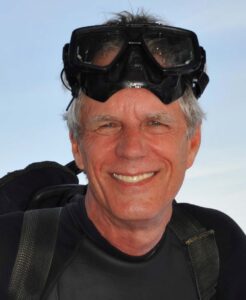 Phil began his reef studies in Discovery Bay, Jamaica in the early 1970’s on the photobiology of reef corals conservation. However, much of his career has focused on human impacts on the vitality of coral reefs. He remains fascinated with sunlight as a driving ecological forcing function of corals and coral reefs, but realized in the 1980’s that unless more effort went into conservation nothing would be left for future generations. A founder of the USEPA Florida Keys Coral Reef/Hardbottom Monitoring Project and Cousteau Society Science Advisor, he pioneered remote sensing techniques to detect coral reef change, collaborated on developing coral molecular stress markers, and discovered White Plague coral disease. Retrospective studies of Jamaican and Floridian reefs that have changed almost beyond recognition, having lost 50% - >95% of their living coral cover, sparked collaborations with non-profits (Trees to Seas, Biosphere Foundation, Raja Ampat Research and Conservation Centre) to engage more locals in reef stewardship guided by science. Just like politics, conservation is local, beginning with local people and their actions.
Phil began his reef studies in Discovery Bay, Jamaica in the early 1970’s on the photobiology of reef corals conservation. However, much of his career has focused on human impacts on the vitality of coral reefs. He remains fascinated with sunlight as a driving ecological forcing function of corals and coral reefs, but realized in the 1980’s that unless more effort went into conservation nothing would be left for future generations. A founder of the USEPA Florida Keys Coral Reef/Hardbottom Monitoring Project and Cousteau Society Science Advisor, he pioneered remote sensing techniques to detect coral reef change, collaborated on developing coral molecular stress markers, and discovered White Plague coral disease. Retrospective studies of Jamaican and Floridian reefs that have changed almost beyond recognition, having lost 50% - >95% of their living coral cover, sparked collaborations with non-profits (Trees to Seas, Biosphere Foundation, Raja Ampat Research and Conservation Centre) to engage more locals in reef stewardship guided by science. Just like politics, conservation is local, beginning with local people and their actions.
Lee Odom
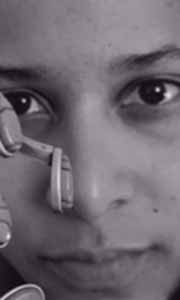 Lee is a musician who has taken her classical training in clarinet performance and expanded to jazz and other genres of music. Lee studied classical clarinet under Dr. Douglas Miller at Appalachian State University in Boone, NC. After receiving a grant from the Hickory Arts Council for her music, Summer Winds, which was geared to 2nd and 3rd year middle school band students, Lee ventured to New York and continued studying music with JD Parron, adding saxophone, flute and bass clarinet. She has performed at various venues and music festival in the NY. Her music repertoire consists of pieces from the classical, jazz, R&B, and groove music.
Lee is a musician who has taken her classical training in clarinet performance and expanded to jazz and other genres of music. Lee studied classical clarinet under Dr. Douglas Miller at Appalachian State University in Boone, NC. After receiving a grant from the Hickory Arts Council for her music, Summer Winds, which was geared to 2nd and 3rd year middle school band students, Lee ventured to New York and continued studying music with JD Parron, adding saxophone, flute and bass clarinet. She has performed at various venues and music festival in the NY. Her music repertoire consists of pieces from the classical, jazz, R&B, and groove music.
Lee has a great concern and respect for our Earth and all its inhabitants and shares a strong love and support for Marine Conservation without Borders. She is honored to be a part this fantastic organization that is dedicated to helping to preserve not only marine life, but Indigenous languages and cultures as well.
Sarah Zurhellen PhD.
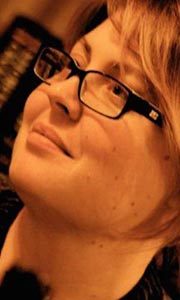 Sarah is a Lecturer in the Rhetoric and Composition Program at Appalachian State University, where she teaches freshman and sophomore writing classes and coordinates e-Portfolio technology for her department. She initially became involved in Marine Conservation without Borders as a senior editor and joined the Board of Directors because of her investment in the organization’s focus on the relationship between conserving ecological and linguistic diversity. Having spent many years as an assistant editor for the international journal Oral Tradition, she is dedicated to the idea that conserving the linguistic diversity of the world is inherently connected to conserving all of our natural resources.
Sarah is a Lecturer in the Rhetoric and Composition Program at Appalachian State University, where she teaches freshman and sophomore writing classes and coordinates e-Portfolio technology for her department. She initially became involved in Marine Conservation without Borders as a senior editor and joined the Board of Directors because of her investment in the organization’s focus on the relationship between conserving ecological and linguistic diversity. Having spent many years as an assistant editor for the international journal Oral Tradition, she is dedicated to the idea that conserving the linguistic diversity of the world is inherently connected to conserving all of our natural resources.
